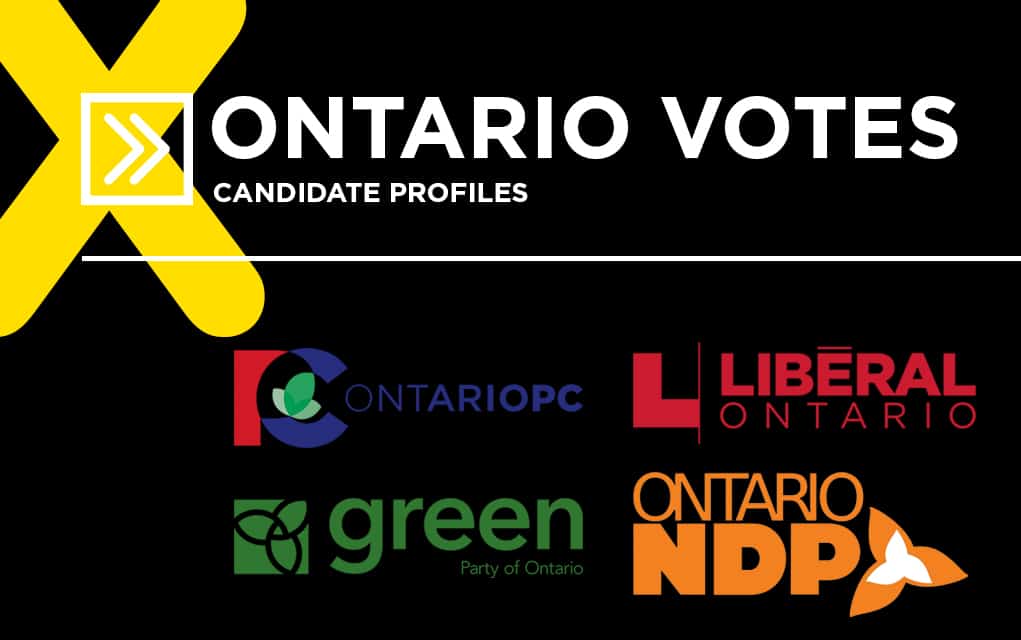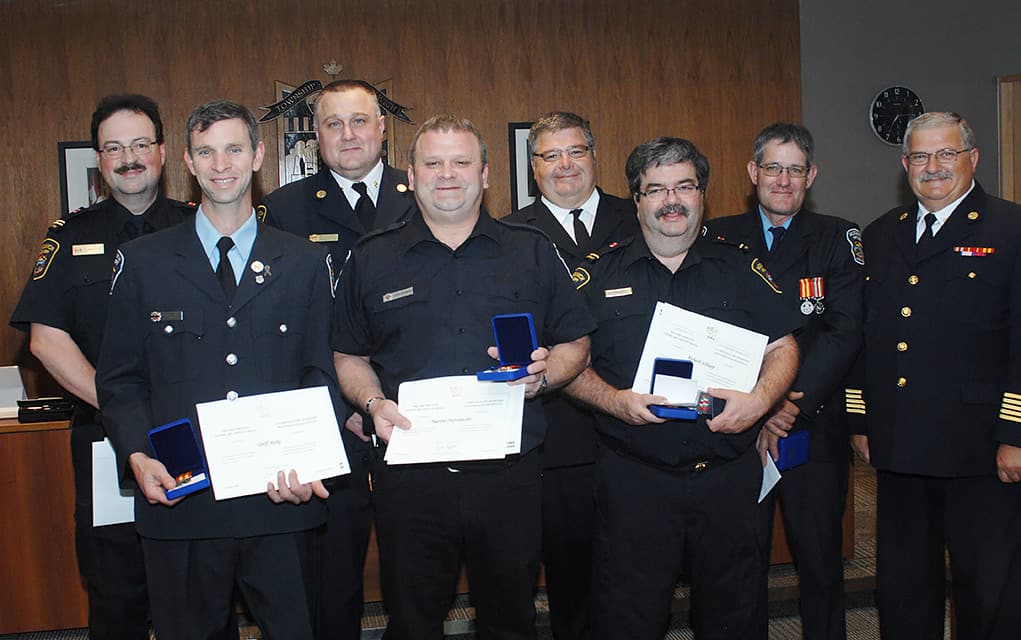
Even Kitchener-Conestoga showing signs of the NDP surge
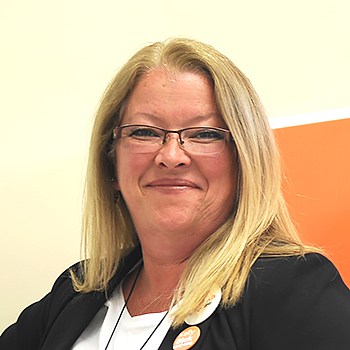
If there is one theme that seems to have dominated the discourse of this election, it is change. But a change to what, is the overriding question. Every candidate is seeking an answer, and for Kelly Dick, that answer is the Ontario NDP.
Running as the New Democrat for Kitchener-Conestoga, Dick is a native of the Westmount/Ottawa area of Kitchener with a background in labour, retail and community advocacy. She’s been politically active for the past eight years, assisting on the campaign trails of fellow NDP candidates and municipal politicians, and is now taking the helm of her own campaign.
“I think the first thing I would say is that we are at a place right now in the political arena in this province where we don’t have to chose bad or worse anymore. There is another option and that’s change for the better. That’s Andrea Horwath and the NDP,” says Dick of says her party’s appeal.
The skyrocketing price of hydro in the province and the sale of Hydro One is a sore point for many voters, notes Dick, and is something the party is looking to redress. The party is looking to reverse the sell-off of the public asset entirely, returning the province to a majority ownership of the utility; also on the platform is a promise to drop hydro prices by 30 per cent.
Healthcare is another major concern of voters, Dick notes, and the NDP is campaigning on a promise to end hallway medicine and “fix” seniors care.
“We are the only party that’s put a platform together and presented it to the people of Ontario. It’s fully costed, you can see exactly where the money’s coming from, you can see exactly where the money’s going to go, and you can see exactly what programs we are going to be moving on,” she says.
Between the finances of the Liberal party, which Dick describes as “sketchy”, and the PC party which has yet to finalize their own platform since Doug Ford took the party leadership, Dick says her party is represents an alternative to the “between bad and worse” of the other two major parties.
A potential draw back to the fiscally conservative is the successive deficits that the party plans to run, at on average $5 billion a year for the next five years.
In the previous election in the Kitchener-Conestoga riding, the NDP claimed 21 per cent of the vote, compared with the Liberal’s 33 and PC party’s 37 per cent. In third place, the party has a fair amount of ground to cover if it hopes to take the long-time Conservative riding.
But with the NDP now polling at 38 per cent support provincially (according to a CBC poll tracker), ahead of the PC’s 37 and Liberal’s much lower 20, a changing of the guard might very well be possible this June.
“People are looking for change. They’re looking for an alternative, they’re looking for something better. And we’re offering a change for the better.”

Bob Jonkman sees Green party as viable option amidst voter dissatisfaction
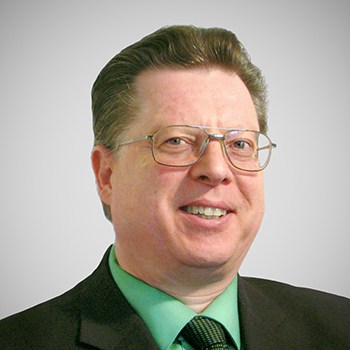
‘It’s not easy being green,’ was the famous refrain of a certain amphibian muppet, but Green, it seems, might very well be what’s called for right now. That’s certainly the dilemma of the local Green party candidate in the Kitchener-Conestoga riding, Bob Jonkman, who is offering a fourth option out from the current power struggle between the big three political parties.
Coming in distant fourth, the Green party has its work cut for it to attract a following, but Jonkman believes there are more than a few compelling reasons for voters to line up behind his party.
“The biggest thing that I’ve heard at the door is people’s desire to vote strategically, to either get the Liberals out or to keep the PCs out,” says Jonkman.
“So I’m not quite sure who they’re voting for instead. But I’m told several times, ‘I’d love to vote Green, my alignment is Green, I’m a green person at heart, but I can’t vote for you this time because I need to keep the bad guys out.’”
An Elmira resident for the past 18 years, Jonkman is a computer consultant by trade. He is also a co-chair of Fair Vote Waterloo chapter which deals with the issue of electoral reform.
That “lesser-of-two-evils” approach (or three evils, depending on your political leanings) often used in politics, while often practical, is also something Jonkman wants discourage in this election.
“That of course is a direct reflection on the bad first-past-the-post system that we have today, where people feel they can’t vote for what they really believe in. They end up voting for something that they don’t like, and then of course they’ll get a government they don’t like because that’s what they voted for.”
But besides the ideological reasons are the more calculated ones. Thanks to a change political financing legislation in Ontario made by the Liberal party, every vote towards a political party can put more money in their coffers for future electioneering and campaigning. Rather than rely on big corporate donations, political parties in Ontario will now receive taxpayer funding depending on the number of votes they receive.
“As a fallback, I’ll point out that Ontario now has a per vote subsidy,” says Jonkman. “So if they really wanted to support the Green Party, the easiest way for them to do it is to actually vote Green, which will provide some funding for the Green Party if they do that.”
It’s a compelling enough argument for those interested in supporting the Green Party, which is campaigning on an ambitiously far-left platform.
Front and centre in its platform is a proposal for a basic income scheme that would essentially provide every person in Ontario with a guaranteed livable income. For the perennial concern of affordable housing, the party’s plan is to require a fifth of every housing development in the province devoted specifically to affordable homes.

Liberal candidate Joe Gowing trying to stem the tides of change
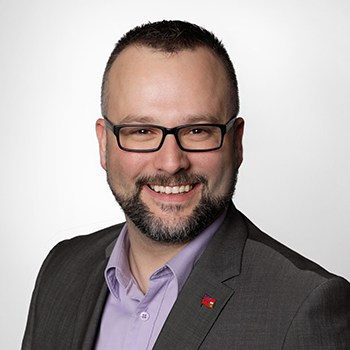
If next week’s trip to the polls is, in fact, the change election opponents of the Liberal party have suggested, then Liberal candidate for the Kitchener-Conestoga riding Joe Gowing has the onerous task of defending the status quo.
A former trustee on the Waterloo Catholic District School Board with professional experience in finance and a mortgage specialist, Gowing is hoping to bring his set of skills and experiences to Queen’s Park.
“Basically what I bring in is I have the election experience, I have the political experience, I’m going to bring in my financial side,” says Gowing, a resident of Kitchener. “I believe in the social services, but we also need to be financially responsible, and those are the two areas that I want to bring into the government, for sure.”
Stay the course may be the message, though Gowing adds that the Liberal party will see changes with an influx of new and young MPPs running in this election. The party’s core philosophy, and the direction it is taking to grow Ontario is ultimately the best for the province, says Gowing, drawing a careful delineation between the mounting deficit concerns and drastic cuts.
“Realistically, we have the plan. We have the better plan to continue to grow Ontario, and I know that again with my background in finance we’re going to stick to our plan, but we also have a plan to get into the black with our debt,” he says.
The Liberal’s Fair Hydro Plan, which has drawn flack from rival political parties, and some criticisms from independent government watchdogs like the Auditor General of Ontario and Financial Accountability Office, was nonetheless the best course of action for the government to take, argues Gowing. Ontarians needed relief from the high price of electricity.
“As a mortgage specialist, when somebody … comes to me with debt problems, living paycheque to paycheque [they] have cash flow issues,” says Gowing. “And realistically that’s what everybody in Ontario was having. Cash flow issues with the hydro bill. So what the government did is exactly what any financial institution would do, is they took the debt that people had, put it together and extended it out”
According to a CBC poll tracker, the Liberal party is sitting at about 20 per cent support, a significant distance from the PC party’s 37 per cent and NDP’s 38 per. Whether those numbers reflect the reality is not something Gowing agrees with, but he does admit to a decline in Liberal leader Kathleen Wynn’s popularity.
“You’re not mistaken. And she actually … came out and publicly stated she know people don’t like her. She’s sorry for that, doesn’t know why, but yes people’s opinions of her are not positive,” he notes.

Democratic reform, including eliminating parties, a draw for Consensus Ontario

It might seem strange to join a political party that intends to render all political parties obsolete, but that is close to what Dan Holt is attempting in this June’s provincial election. Elmira residents will recognize Holt for his bid for Ward 1 councillor in the last municipal election.
Holt has now set his sights on Queen’s Park, lending his support to new and relatively obscure Consensus Ontario party. Holt does not expect to win on the Consensus ticket, but he is keen to champion the reforms and philosophy at the core of the party.
“I like the idea of consensus, I like the idea of democracy and representative government, I like the idea of not being tied to a party boss who’s going to tell you what to do,” he explained.
At the centre of the party’s ideology is the belief that locally elected representatives should not be bound to the directives of a political party or leader, as is somewhat the case for most of the major parties.
As it stands, most MPP’s have to vote the way their party requires them to vote on key issues, rather than follow the wishes of their constituents, and those that don’t can be penalized in various ways by their leader. It’s a system that often forces elected representatives to carry water for their leaders even when it goes against the demands of local voters.
“It’s interesting, you know, I mean you have to be a party to be elected. And the whole purpose of Consensus Ontario is to eventually eliminate parties, including Consensus Ontario,” says Holt. “The idea being that the candidate would be independent and elected as representatives of their constituency and their riding, and not beholden to a party or policies governing a party.”
In that way, the elected members of the legislature would better resemble their counterparts on the municipal level in that they would not belong to any party. It’s one of the reasons he says the party reached out to him to run in the Kitchener-Conestoga riding under their banner.
While Holt is not expecting the idea to take off all at once, he is still keen for voters to come out and support him in the election.
“Well I’d like for them to vote for me, because I’d like for the statement to be made that they’ve seen what Consensus Ontario is all about and they’re interested and support the idea. So I do want them to vote for me and I hope I get some votes, but realistically speaking at this point the way the parties are so entrenched it’s very difficult to break through that barrier and get people to the point where they will vote for someone other than the party.”
On his future plans, whether Holt intends to stay with Consensus or run for Woolwich Township council, Holt is unsure.
“I just don’t know,” he says. “I mean, yes I think the idea [behind Consensus Ontario] is good and I support the idea, and I would want to see them grow and come to fruition. But I don’t know how much I’m going to be involved because I don’t know what’s going on in my personal life three or four years from now.”

Making a case for a Libertarian approach to the issues Ontarians face

This is Daniel Benoy’s first crack at running as representative for the Libertarian party in the Kitchener-Conestoga riding, where voters join fellow Ontarians in going to the polls June 7.
“I didn’t expect there to be so much attention,” he said of the experience. “I’ve been flooded with emails and calls. I don’t have a staff like the big parties, it’s just me.”
He has been living in the area since he was eight years old, and has been active in the community since then. Currently, he worked as a systems architect at Descartes Systems Group Inc. Other companies he has worked for include BlackBerry and other IT companies in the Waterloo area before volunteering as a political representative.
“The core idea is to keep government involvement in our life as small as possible,” he explained of the concept of libertarianism. “So lowering taxes, but also being very socially liberal. Uninvolving the government in people’s sex lives, banning certain substances, that sort of thing. It is sort of a blend between the more traditional conservative and liberal views, we’re socially liberal but fiscally conservative.”
He strongly believes in reducing the amount of regulatory capture. Regulatory capture is the larger firms or political groups financial interests being prioritized over the interest of the public.
He also mentioned that there needs to be a way to make houses more affordable, and has proposed solutions for how to make that happen.
“So if there’s any land out there, perhaps zoning regulations, perhaps it’s some other nonsense, if there’s something keeping them from building, then the Libertarians would want to remove that as much as possible, increasing the supply of housing,” he explained. “And then pushing the price down as a result. Although people might not be a huge fan of this if they own a lot of real estate.”
“I have an opinion on every issue,” he added. “I wouldn’t be a politician if I didn’t.”
He firmly believes that people have the right to freedom of speech, pointing to the ordeal faced by Wilfrid Laurier University teaching assistant Lindsay Shepherd as an example.
“We’re very socially liberal so we want people to say whatever they please,” he said on the issue. “There was an issue where it happened where it seemed that the Laurier University was intimidating one of their teaching assistants because she wanted to share an opposing opinion. It was basically just a not-that-offensive, conservative opinions of how someone should, whether or not someone should be compelled to address transgender individuals using their pronouns of choice. I don’t know if I necessarily want to weigh in how I feel about that issue, but I think that university people should be able to discuss it. That teaching assistant was intimidated in front of a reprimand committee,” he said.
[Daniel Benoy’s profile was written by reporter Veronica Reiner]

Conservative candidate running on a platform of fiscal responsibility

There’s been a fair amount of unusual happenstances surrounding the Ontario PC party these past months muddying the waters. Perhaps not in the least is shared name between the Kitchener-Conestoga riding’s candidate Mike Harris, and the Conservative politician that he is hoping to replace, Michael Harris, with whom he shares no relation.
Rather, candidate Mike Harris is the son of the former Ontario premier Mike Harris, and it’s that familial connection Harris says gives him a certain aptitude and experience with politics.
“I’ve grown up with politics in my blood,” says Harris, a North Bay native who has been living in Waterloo for the past five years. “I’ve been around the political landscape for a very long time.”
“There’s been a big appetite for change at the doors. A lot of people are very concerned with the mounting debt and how we’re going to be able to pay that back. And of course the cost of living with sky rocketing hydro rates, utility rates, the price cost being very high, there’s a lot of people concerned that they’re not going to be able to afford some of those luxuries in life. And a lot of people are just concerned about putting food on their table.”
Of the three major parties, only the PC party are promising a swift balancing of the province’s books, though have yet to release a firm timeline on when that would happen. In the immediate term, the party has said they plan to continue running a deficit, but the party is still working on a platform under its new leadership.
“We’re the only party that is going to bring fiscal management back to Queen’s Park. And we’re the only party that is going to put money back into your pockets by lowering taxes, by lowering hydro rates, lowering gas rates, scrapping the carbon tax,” says Harris.
“There’s no reason for companies to be able to pay to pollute. There needs to be more regulation that’s put in place to make sure that we’re protecting the environment.”
But it is especially the cost of electricity and the debt being accrued to combat that is what drew Harris into current politics, he says. While the PC party and Liberal share some points in their plan to tackle rising costs, there are some key differences between them.
“There’s a major difference between what the Liberals have done over the last year to, we’ll say artificially lower rates by borrowing money to pay back into the system,” says Harris.
“So we’re going to return all of the Hydro One dividends to customers … We’re going to stop the practice of burying the costs of conservation programs on hydro bills,” he says. “And there’ll be an immediate moratorium on any new energy contracts, so we’re talking green energy initiatives and those types of things, as part of the Green Energy Act.”


